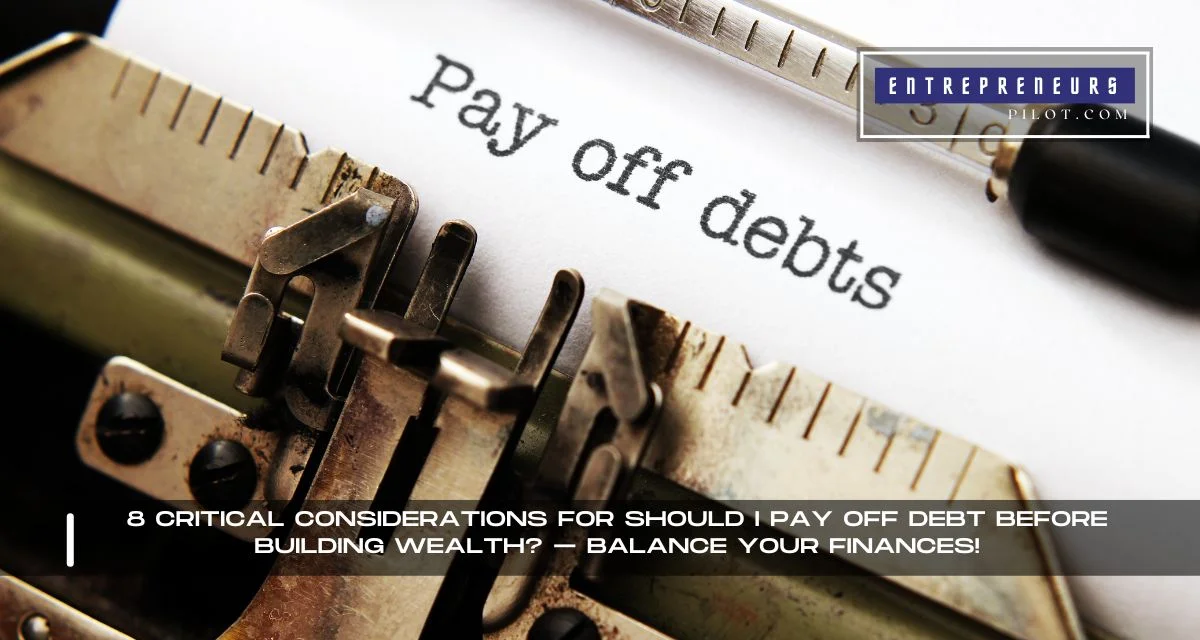The dilemma of whether to prioritize paying off debt or to focus on building wealth is a common financial conundrum. Should I Pay Off Debt Before Building Wealth? is a crucial question that requires careful consideration. This blog post delves into eight critical factors to help you balance your finances effectively.
Addressing this question isn’t just about numbers; it’s about understanding your personal financial situation, your goals, and the psychological impact of debt. We’ll guide you through each consideration, providing insights to make an informed decision that aligns with your long-term financial wellbeing. Let’s unravel these considerations to find the best path for your financial journey.
Table of Contents
1. Interest Rates on Debt vs. Potential Investment Returns
Compare the interest rates of your debt with the potential returns from investments. If your debt has a higher interest rate, paying it off first may save you more money in the long run.
2. Psychological Impact of Debt
Consider how debt affects you mentally. For some, the stress of debt can outweigh the benefits of investing. Paying off debt can bring peace of mind, which is invaluable.
- For Expert Financial Insights And Guidance, You Can Visit Our Sister Site – ArabsGeek.com Now!
- Curiosity Piqued? Dive Into the Most Captivating Financial Content by Visiting Our Homepage!
- Unlock Exclusive Business Opportunities! 🚀 Connect with Us Now at our Email: [email protected]!
3. Emergency Fund Status
Before aggressively paying off debt or investing, ensure you have a solid emergency fund. This fund acts as a safety net for unexpected expenses, reducing the need to accrue more debt.
4. Debt Type: Good Debt vs. Bad Debt
Not all debt is equal. ‘Good’ debt, like a mortgage, can have tax benefits and potentially increase in value. High-interest consumer debt, often considered ‘bad’ debt, should typically be paid off first.
5. Retirement Savings
Neglecting retirement savings, especially if your employer offers a matching contribution, can be a costly mistake. Balance paying off debt with contributing to your retirement fund.
6. Tax Implications
Consider the tax implications of your investments and your debt. Sometimes the tax benefits of certain investments can outweigh the cost of holding onto debt.
7. Your Financial Goals
Align your strategy with your financial goals. If becoming debt-free is a priority, focus on paying off debt. If you’re more driven to build wealth, investing might be your path.
8. Risk Tolerance and Time Horizon
Assess your risk tolerance and investment time horizon. If you have a longer time horizon and a higher risk tolerance, investing may be more suitable.
Conclusion
Deciding whether to pay off debt before building wealth depends on various personal factors, including your financial goals, risk tolerance, and the emotional impact of debt. Carefully weigh these considerations against each other to make a decision that best suits your financial situation and future aspirations.
Frequently Asked Questions
Q1: Is it ever a good idea to invest while still in debt?
A: Yes, especially if the returns on your investments outweigh the cost of your debt or if you’re maximizing employer-matched retirement contributions.
Q2: Should I stop all investing until my debt is paid off?
A: Not necessarily. It might be more beneficial to balance both, especially if you have low-interest debt.
Q3: How can I balance paying off debt and saving for emergencies?
A: Start by building a small emergency fund, then focus on paying off high-interest debt. Gradually increase your emergency fund as your debt decreases.
Q4: Can paying off debt improve my credit score?
A: Yes, reducing your overall debt can have a positive impact on your credit score, especially if you’re paying down high credit card balances.
Q5: What’s the first step in deciding between debt repayment and investing?
A: Start by assessing your financial situation – list all your debts, their interest rates, your monthly income, and potential investment returns. This will give you a clearer picture of your financial landscape.











